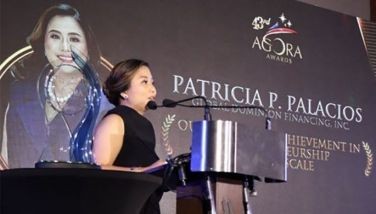AI-driven political weapons

The Philippines is the venue of the three-day conference of the Asia and South Pacific Joint Operations Against CyberCrime (ASPJOC) to be held starting tomorrow at the New World Hotel. Organized yearly by the International Criminal Police Organization (Interpol), the ASPJOC aims to strengthen the capability of each and every Asian and South Pacific national law enforcement agency to prevent, detect, investigate and disrupt cybercrimes.
In behalf of the Philippine government, the Cybercrime Investigation and Coordinating Center (CICC) under the Department of Information and Communications Technology (DICT) is chiefly involved in the ASPJOC. Headed by DICT Undersecretary Alexander Ramos, the CICC is leading the welcome rites for the ASPJOC taking place in our country at a very opportune time. On the sidelines of our Kapihan sa Manila Bay news forum last Wednesday, Ramos revealed the Interpol-organized ASPJOC will be the first ever held in our country.
The Philippines is among the “beneficiary member-countries” of the ASPJOC principally funded by the Foreign, Commonwealth & Development Office of the United Kingdom. The others include Brunei, Cambodia, Fiji, Indonesia, Kiribati, Laos, Malaysia, Marshall Islands, Nauru, Papua New Guinea, Samoa, Singapore, Solomon Islands, Thailand, Timor-Leste, Tonga, Vanuatu and Vietnam.
The APSJOC helps these beneficiary member-countries by gathering and analyzing information on cybercriminal activitities; promoting cooperation and good practices amongst Asia and South Pacific member-countries and facilitating and carrying out intelligence-led, coordinated action against cybercrimes.
While these cybercrime syndicates operate as if they can get away with their illegal activities, the last line of defense in this part of the world is aided by the APSJOC to combat the borderless internet highway and even in the so-called dark web. In our country, the CICC is the lead implementing government agency created by the Cyber Crime Prevention Law or Republic Act (RA) 10175.
Signed into law on Sept.12, 2012, RA 10175 defined and penalized cybercrime cases from scamming or swindling and other fraudulent schemes aimed at tricking someone for personal gain. According to the Philippine National Police (PNP), cybercrimes have become the No.1 reported crime in our country.
At a forum held here last week, Interpol head of cybercrime intelligence unit Ivo de Carvalho Peixinho called upon policy-makers to consider introducing regulations against so-called “deepfakes.” Feared to intensify with the early onset of elections fever taking place in May 2025, deepfakes cover audio, images and videos that are edited through artificial intelligence (AI). Such generative AI can closely imitate not only the physical likeness but also the voice and demeanor of targetted personalities.
At the forum hosted by cybersecurity giant Trend Micro, Peixinho warned against deepfakes that can be used to deceive people into believing that someone did or said something even when in reality, they did not. This is certainly not only a deceptive black propaganda scheme but becomes dangerous during a hotly contested election, when tensions are running high between and among opposing political camps.
With the intent of misleading people, it surely can be weaponized by unscrupulous politicians and their paid hacks to trick voters.
Online disinformation is nothing new in the Philippines, where social media is actively used in the proliferation of so-called fake news. The mainstream or legacy media could only thank the advent of fake news platforms in social media for restoring, if not further boosting, the trust of Filipinos in credible news platforms such as The STAR.
Hands down, our country is a hotbed for online disinformation during elections. In fact, Meta erased more than five million pieces of content from Facebook and Instagram for breaching community standards at the height of the May 2022 presidential elections in the Philippines. Some of the removed content were found to be inciting violence against certain candidates, promoting hate campaigns, outright bullying posts and virtual harassment.
Our own Commission on Elections (Comelec)
has stepped up to the daunting challenges posed by these generated AI as now applied to campaign schemes. The seven-man poll body headed by Chairman George Erwin Garcia is set to release this week the new Comelec guidelines on campaigning, months ahead of the official campaign period next year.
The political campaign in our country practically kicks off with the filing of certificates of candidacy (COCs) of all national and local bets, which the Comelec has set on Oct.7-12. Under existing rules followed by the Comelec, the aspirants are not yet candidates upon the filing of COCs but only on the first day of the campaign period.
However, as early as this week, the Comelec will promulgate the Guidelines/Regulations of Social Media, AI and other internet-based technology for digital campaign. With the Comelec’s adoption of a new automated election system (AES) using the Miru Systems of South Korea, it would be doubly challenging for the poll body.
Taking no chances, Garcia announced last week the Comelec en banc has approved the proposal to conduct a parallel assessment of Miru’s AES machines to be used in next year’s local and national elections. According to him, the Department of Science and Technology (DOST) is set to conduct a parallel test aside from the one to be done by the international certification entity (ICE).
Under the Amended Poll Automation Law, the Comelec was mandated to tap an ICE to evaluate the AES of every election. The ICE must categorically state that the AES, including its hardware and software components, is “operating properly, securely and accurately” in accordance with the law.
Top officials of the DOST, along with the DICT and Comelec regional directors accompanied by Comelec Commissioners Ernesto Maceda Jr. and Socorro Inting, flew last month to South Korea for another round of tests of Miru’s AES machines. Veteran election lawyer Romulo Macalintal and Toti Cariño of Philippine Computer Society joined their delegation as private sector representatives.
There are the usual birthing pains for any new system. But worse are the possible technology glitches and human error in the use of the new AES machines. Adding to it is how AI-driven political weapons can mess things up.
- Latest
- Trending
























